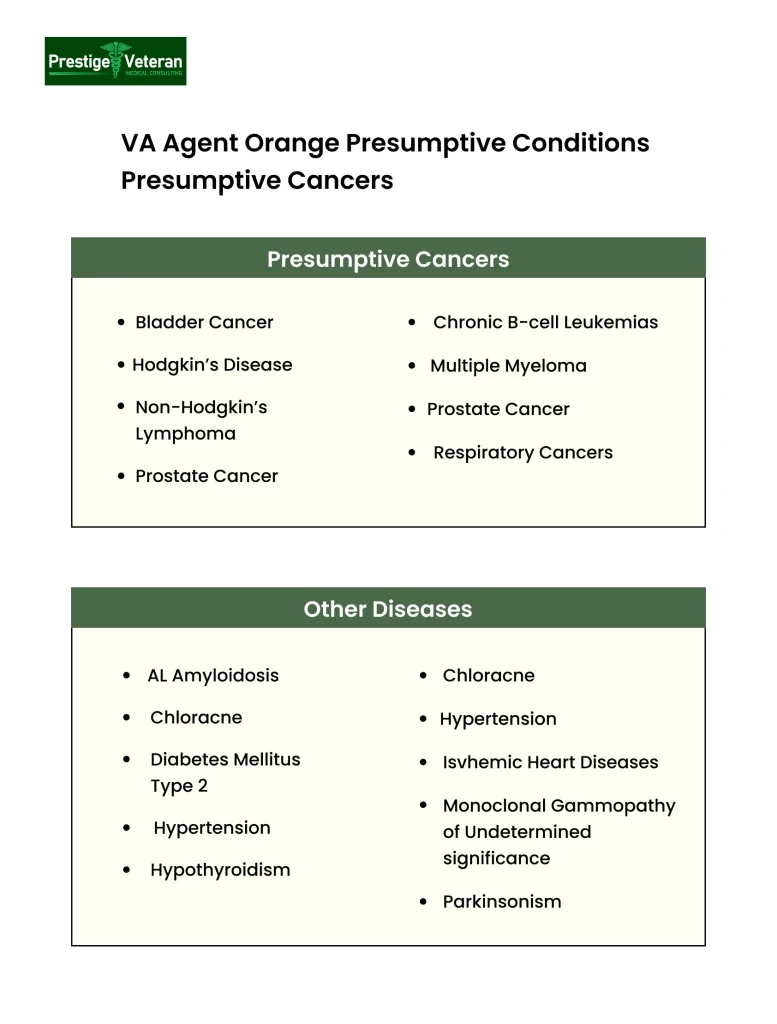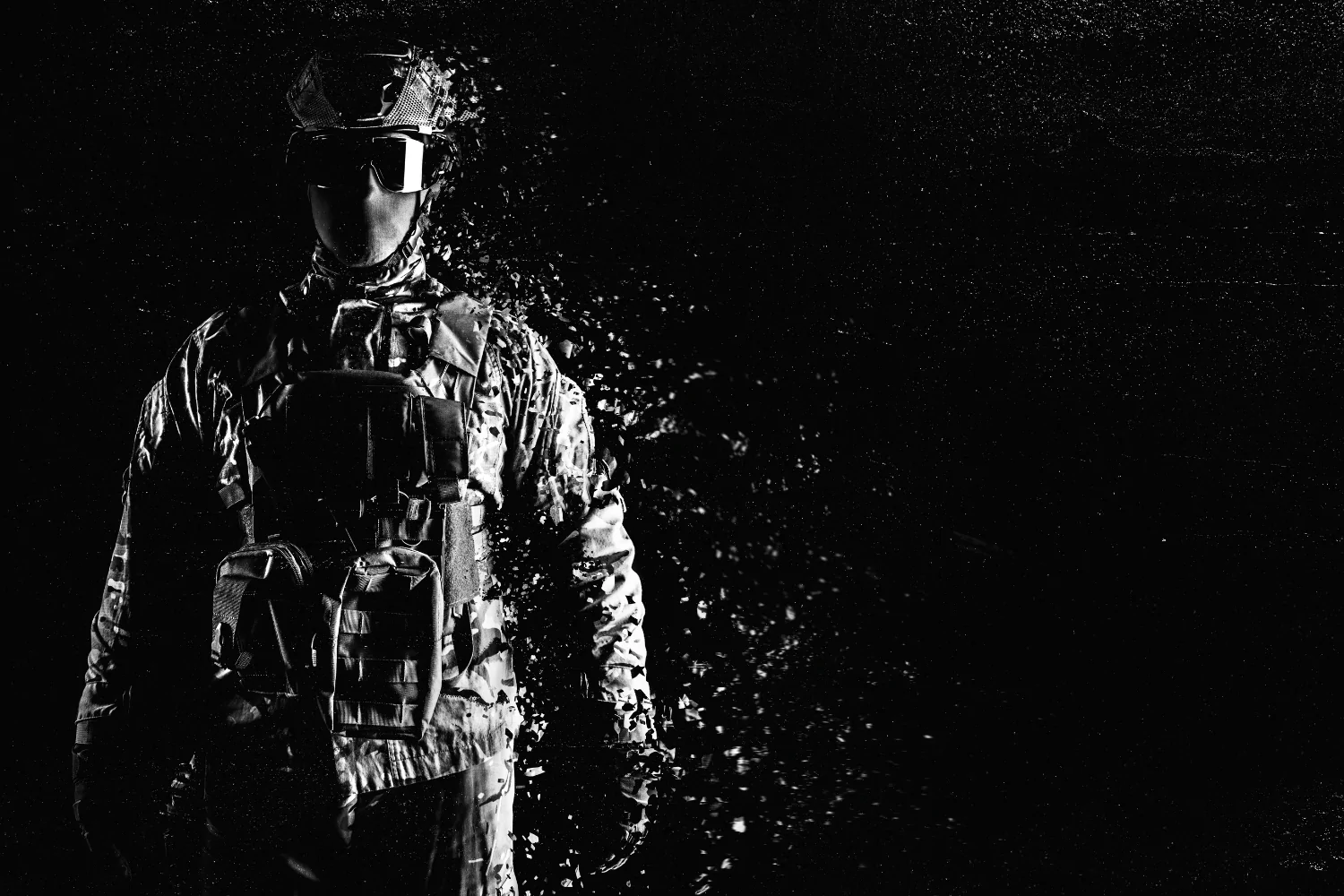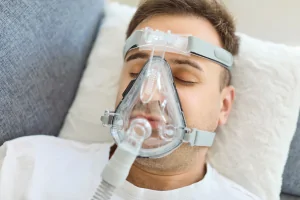Agent Orange, a herbicide infamous for causing devastating health effects among veterans due to its widespread use by the U.S. military to clear dense vegetation during the Vietnam War. Over the years, the Department of Veterans Affairs (VA) has implemented presumptive conditions related to this exposure, easing the claims process for veterans seeking disability compensation.
This detailed guide delves into Agent Orange presumptive conditions, eligibility criteria, the claims process, and the latest developments to ensure veterans are equipped with the information needed to secure their VA benefits.
Table of Contents
What Is Agent Orange and Its Impact on Veterans?
Agent Orange, one of the “Rainbow Herbicides”, was a powerful herbicide used by the U.S. military during the Vietnam War to eliminate dense forest cover and destroy enemy crops. Its chemical composition included a highly toxic compound called dioxin, which has been linked to severe health and environmental problems. Over 300,000 U.S. veterans have lost their lives due to Agent Orange exposure which is nearly five times the 58,000 who died in combat.
For many Vietnam veterans, the effects of dioxin exposure did not surface until years or even decades after their military service. Conditions like various cancers, heart disease, diabetes, and neurological disorders have been tied to dioxin exposure. The severity of these illnesses often leaves veterans unable to work, requiring extensive medical care and affecting their quality of life.
Adverse Effects on Veterans’ Children
Scientific evidence suggests that dioxin exposure can have generational effects, including physical and mental disability. A meta-analysis published in the International Journal of Epidemiology found a statistically significant association between parental exposure to Agent Orange and increased risk of spina bifida and certain other birth defects in their children. Moreover, a ProPublica analysis reported that exposed veterans had more than a one-third higher likelihood of having children with birth defects.
Recognizing the devastating impact of this exposure, the VA has developed specific policies to support those exposed to this harmful chemical.
What Are Presumptive Conditions?
Presumptive conditions are illnesses scientifically and medically linked to exposure, acknowledged as service-connected for veterans who served in specific locations and periods. Under the Agent Orange Act of 1991, the VA established a list of presumptive conditions to simplify the claims process for veterans exposed to Agent Orange. The VA identifies conditions presumed to be connected to dioxin exposure through a scientific review conducted by the Health and Medicine Division (HMD) of the National Academy of Sciences, Engineering, and Medicine.
The VA acknowledges that proving direct causation for Agent Orange related conditions is often impossible due to the passage of time. Therefore, if an army, military, navy, air, or space veteran meets the service criteria and has a diagnosis of a presumptive condition, the VA assumes the illness is service-related. Essentially, a presumption of exposure removes the need for the veteran to provide a “nexus” linking their disability to herbicide exposure.
The passage of the 2021 National Defense Authorization Act (NDAA) expanded the presumptive conditions list, further ensuring that Vietnam-era veterans and their families receive the compensation they deserve.
VA Presumptive Conditions List for Agent Orange Exposure
The VA has established a list of illnesses presumed to be caused by Agent Orange and other herbicide exposure. This means veterans diagnosed with these conditions do not need to prove a direct connection between their military service and illness.

Presumptive Cancers List
- Bladder Cancer
Cancer that affects the bladder, where urine is stored before leaving the body. - Chronic B-cell Leukemias
This includes all chronic B-cell leukemias, such as hairy-cell leukemia and chronic lymphocytic leukemia, which impact white blood cells. - Hodgkin’s Disease
A malignant lymphoma characterized by progressive enlargement of the lymph nodes, liver, and spleen, along with anemia. - Multiple Myeloma
A type of cancer that forms in plasma cells, which are specialized white blood cells located in the bone marrow. - Non-Hodgkin’s Lymphoma
A group of cancers affecting the lymphatic system, including lymph glands and tissues. - Prostate Cancer
A common cancer among men that originates in the prostate gland. - Respiratory Cancers
This includes cancers related to the lung, larynx, trachea, and bronchus. - Soft Tissue Sarcomas
A category of cancers occurring in body tissues such as muscles, fat, blood vessels, and connective tissues, excluding osteosarcoma, chondrosarcoma, Kaposi’s sarcoma, and mesothelioma.
Other Diseases Included in the Presumptive List
In addition to cancers, other illnesses linked to Agent Orange exposure may also qualify Veterans and their survivors for VA disability benefits:
- AL Amyloidosis
A rare condition caused by the buildup of abnormal proteins (amyloid) in tissues or organs, leading to significant health issues. - Chloracne (or similar acneform disease)
A skin condition resembling severe teenage acne that appears after exposure to certain chemicals. It must be at least 10% disabling within one year of herbicide exposure under VA regulations. - Diabetes Mellitus Type 2
A chronic condition where high blood sugar levels result from the body’s inability to properly use insulin. - Hypertension
High blood pressure, which can lead to serious cardiovascular issues if left untreated. - Hypothyroidism
A condition where the thyroid gland produces insufficient hormones, leading to a variety of symptoms. - Ischemic Heart Disease
A condition caused by reduced blood flow to the heart, often leading to chest pain and other complications. - Monoclonal Gammopathy of Undetermined Significance (MGUS)
A condition involving abnormal protein production in the blood, which may lead to serious health concerns. - Parkinsonism
A group of conditions that cause symptoms such as slow movements, stiff muscles, tremors, and difficulty speaking. - Parkinson’s Disease
A progressive nervous system disorder that primarily impacts movement and muscle control. - Peripheral Neuropathy, Early-Onset
A nervous system disorder causing numbness, tingling, and motor weakness. It must be at least 10% disabling within one year of herbicide exposure to qualify for VA benefits. - Porphyria Cutanea Tarda
A condition marked by liver dysfunction and skin sensitivity to sunlight, resulting in blistering and thinning of the skin. It must meet VA criteria of 10% disabling within one year of herbicide exposure.
Veterans diagnosed with any of these conditions may file a claim for VA disability benefits. If your illness is not on the presumptive list but you believe it stems from Agent Orange exposure, you can still file a claim with additional supporting evidence as needed.
PACT Act Expansions: New Conditions and Locations
The Honoring Our Promise to Address Comprehensive Toxics Act (PACT Act) of 2021 expanded both presumptive conditions and locations for Agent Orange exposure.
New Presumptive Diseases
- Hypertension (high blood pressure)
- MGUS (Monoclonal gammopathy of undetermined significance)
New Presumptive Locations
Veterans who served in the following Agent Orange presumptive locations and timeframes may now qualify for exposure:
- Thailand: U.S. or Royal Thai military bases (1962–1976)
- Laos: December 1, 1965–September 30, 1969
- Cambodia: Mimot or Krek, Kampong Cham Province (April 16–30, 1969)
- Guam or American Samoa: Including territorial waters (1962–1980)
- Johnston Atoll: January 1, 1972–September 30, 1977
Veterans previously denied claims based on location may be eligible to reopen their cases under these new guidelines.
Eligibility for Agent Orange Benefits
Service Location and Timeframe
Eligibility for Agent Orange-related disability benefits is based on whether a veteran served in areas where the herbicide was used. The Veterans Affairs presumes toxic herbicide exposure if you served in the following locations and timeframes:
- Vietnam: Between January 9, 1962, and May 7, 1975, including inland waterways or within 12 nautical miles of Vietnam and Cambodia.
- Korean Demilitarized Zone (DMZ): Between September 1, 1967, and August 31, 1971.
- Thailand: On or near bases with herbicide use from January 9, 1962, through June 30, 1976.
- Other Locations: Including Laos, Cambodia, Guam, American Samoa, and Johnston Atoll, as noted under the PACT Act.
Additionally, veterans who operated, maintained, or regularly interacted with C-123 aircraft used in Operation Ranch Hand may qualify.
Filing a VA Disability Claim for Presumptive Conditions
According to VA.gov, to qualify for VA disability benefits, veterans must satisfy the following two key criteria:
- Diagnosis of a Presumptive Condition: The condition must appear on the VA’s Agent Orange presumptive conditions list, such as certain cancers, diabetes, or ischemic heart disease.
- Service in a Qualifying Location and Timeframe: Veterans must prove their presence in areas where Agent Orange exposure occurred, such as Vietnam, the Korean DMZ, or eligible bases in Thailand during a recognized period.
If these conditions are met, veterans can access VA disability compensation and healthcare. Even for conditions not on the presumptive list, veterans can establish a direct connection to exposure with additional evidence in some cases.
The Critical Role of a Nexus Letter in Non-Presumptive Claims
While never required, a nexus letter, or an independent medical opinion, can be vital for veterans with conditions not included on the presumptive list at times. This document, written by a medical professional like a primary care physician, specialist, or an independent medical opinion provider, aims to establishes a direct connection between the veteran’s condition and Agent Orange exposure.
What Makes a Strong Nexus Letter?
- Clear Connection: The doctor often states that it is “at least as likely as not” that the condition is linked to Agent Orange exposure.
- Detailed Explanation: The letter should explain how the veteran’s symptoms or condition align with the known effects of dioxin exposure.
- Specialist Input: A nexus letter from a relevant specialist (e.g., an oncologist for cancer or a pulmonologist for respiratory issues) can carry significant weight in substantiating the disability benefits claim.
Example:
A veteran with a non-presumptive skin condition can include a nexus letter from a dermatologist explaining how their condition aligns with the known effects of dioxin exposure from Agent Orange. The letter may detail how dioxin exposure damages the skin at a cellular level and conclude that it is “at least as likely as not” connected to the veteran’s exposure. Such expert insights can be pivotal in winning a VA claim.
Evidence Needed to Strengthen Agent Orange Claims
Regardless of the condition, Vietnam veterans require evidence to prove service connection:
- Medical Records: Include military, VA, or private medical documentation of a confirmed diagnosis from the presumptive list.
- Service Records: Submit DD-214 form, awards, or personnel files verifying deployment to qualifying areas.
- Nexus Evidence for Secondary Conditions: Link complications like heart failure, kidney diseases, or depression to an exposure-related condition with a nexus letter when needed. If you are unsure if you would benefit from this type of report, engaging an accredited legal professional is always a smart option. Claiming benefits for secondary conditions along with primary conditions may increase your VA rating.
Filing a VA Claim for Compensation
Veterans can file a VA claim online at VA.gov, by mailing VA Form 21-526EZ to the VA Claims Intake Center, in person at a local VA office, or through a VA-accredited attorney or service organization. For secondary connection claims, it’s helpful to include medical records linking secondary conditions to Agent Orange-related primary disabilities.
Additional Benefits for Exposed Veterans
Veterans exposed to Agent Orange may also qualify for:
- Special Monthly Compensation (SMC): For severe disabilities requiring aid and attendance.
- Total Disability Individual Unemployability (TDIU): For veterans unable to work due to their conditions.
- Dependent Benefits: Support for children and spouses affected by hereditary impacts or birth defects tied to exposure.
If a claim was previously denied, veterans can file a supplemental claim if new evidence or updates, such as the PACT Act, apply to their situation.
Recent Developments in Agent Orange Benefits
2019: The Blue Water Navy Vietnam Veterans Act extended benefits to “Blue Water” Navy veterans who served offshore Vietnam, granting presumptive service connection for related conditions.
2021: Bladder cancer, hypothyroidism, and Parkinson’s-like symptoms were added to the VA’s presumptive list for Agent Orange exposure under the 2021 NDAA after studies showed “suggestive” evidence.
2022: The PACT Act expanded the list of locations for presumed Agent Orange exposure, enhancing access to benefits for veterans in areas like Guam, American Samoa, and Johnston Atoll.
2024: The VA proposed further expanding locations, including parts of the U.S., Canada, and India, and added two new presumptive diseases:
- Hypertension (high blood pressure)
- Monoclonal Gammopathy of Undetermined Significance (MGUS), a precursor to certain blood cancers.
Revisiting Denied Claims: Under the updated provisions, veterans whose claims were previously denied can now file supplemental claims if symptoms emerged within 10 years of service or their condition or location has been added.
These updates aim to ensure veterans exposed to toxic herbicides receive appropriate VA health care and compensation.
Ensure Your Disability Compensation with Professional Assistance
Filing for Agent Orange-related benefits requires thorough documentation, especially for non-presumptive conditions. A well-crafted nexus letter from a qualified medical professional can be helpful in some cases in securing VA disability compensation. Veterans are encouraged to consult with legal representatives or Veteran Service Organizations (VSOs) to strengthen their claims and ensure all supporting evidence is presented effectively.
Conclusion
Agent Orange exposure has caused immeasurable harm to countless veterans, but the VA’s presumptive conditions framework provides a pathway for compensation and care. By understanding eligibility criteria, submitting strong evidence, and staying informed about policy changes like the PACT Act, veterans can navigate the claims process successfully.
If you or a loved one has been affected by this life-threatening exposure, don’t wait to seek help. With the right resources and support, securing the VA disability compensation benefits you deserve is not only possible—it’s your right.
FAQs
What are the presumptive illnesses of Agent Orange?
Presumptive illnesses include various cancers (such as prostate cancer and respiratory cancers), Type 2 diabetes, hypertension, ischemic heart disease, and neurological disorders like Parkinson’s disease, among others listed by the VA.
Does the VA automatically approve presumptive conditions?
Every case is unique. Generally speaking if a Veteran meets criteria and has a diagnosis on the presumptive conditions list, they have a good chance of being connected.
How do you prove Agent Orange exposure?
Agent Orange exposure is proven by demonstrating service in qualifying locations and timeframes using service records, such as deployment to Vietnam, Thailand, or other recognized areas, as outlined by the VA.
What is the PACT Act for Agent Orange?
The PACT Act significantly expands VA benefits for veterans exposed to toxic substances like Agent Orange. It adds new presumptive conditions, including high blood pressure and MGUS, and extends coverage to locations such as Laos, Guam, and Johnston Atoll.
What if My Condition Is Not on the Presumptive List?
Veterans with non-presumptive conditions can still file a claim but must provide:
- A current medical diagnosis.
- Evidence linking the condition to Agent Orange exposure, such as a positive opinion at the C&P exam, nexus letter or scientific research.
What Is the Agent Orange Registry Health Exam?
This free exam alerts veterans to the possible long-term health effects of Agent Orange exposure. It includes a medical history review, lab tests, and referrals for further care.
Is lymphedema presumed in Agent Orange exposure?
No, lymphedema is not currently presumed to be associated with Agent Orange exposure under VA regulations.
Also read: Agent Orange Exposure and Veterans Disability
At Prestige Veteran Medical Consulting, a veteran-owned company, we specialize in Independent Medical Opinions (IMOs) known as Nexus letters.
Our purpose is to empower YOU, the veteran, to take charge of your medical evidence and provide you with valuable educational tools and research to guide you on your journey.
Understanding the unique challenges veterans face, our commitment lies in delivering exceptional service and support.
Leveraging an extensive network of licensed independent medical professionals, all well-versed in the medical professional aspects of the VA claims process, we review the necessary medical evidence to incorporate in our reports related to your VA Disability Claim.
Prestige Veteran Medical Consulting is not a law firm, accredited claims agent, or affiliated with the Veterans Administration or Veterans Services Organizations. However, we are happy to discuss your case with your accredited VA legal professional.
















One Response